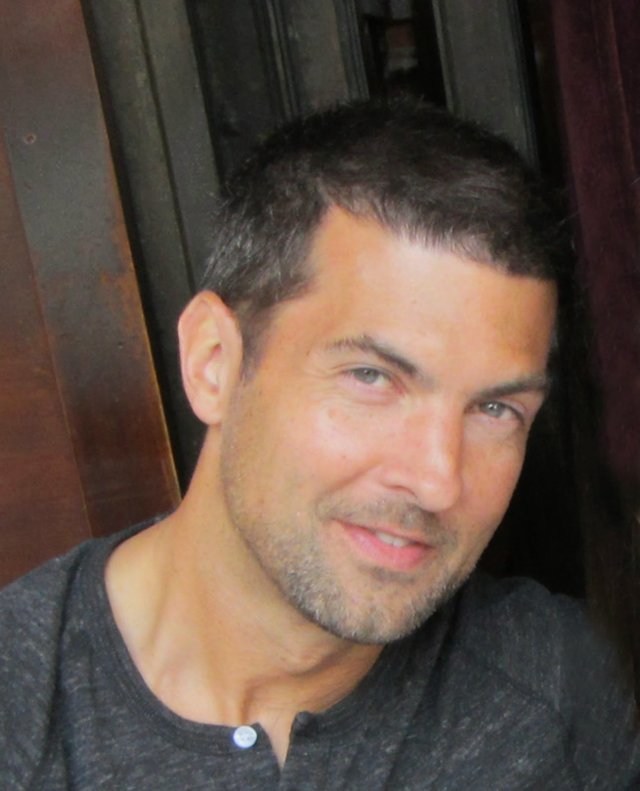
Tom Howard
“You must have a flashlight, / and you should have a storm.” So begins Tom Howard’s poem in volume XXXV of The Worcester Review. In the following post, Howard discusses this poem, “Rules for Telling a Ghost Story,” and reveals his thoughts on writing.
How do you go about writing? What is your writing routine?
Last summer my family and I went to the Outer Banks for the week, along with our dog. The dog was sick the whole week, and my wife and I had to wake up before dawn every day to carry him outside because he was afraid of the stairs. I ended up sitting on the beach with the dog every day, watching the sunrise. And I thought: this is a perfect way to start writing every day, other than the dog being sick and having to carry him up and down the stairs.
Away from the beach and with a full-time job, I just try to find a quiet corner of the house as often as I can. I read through whatever I’m working on, try to understand where it wants to go and if it’s worth me following it there. I spend an hour or two rewriting the same lines, looking for ways to surprise myself or make myself laugh or just find something honest to say, and then I throw the lines out completely and start over. There’s a lot of that. When things are going well, I also pace quite a bit.
While “Rules for Telling a Ghost Story” is a poem, you also write fiction. Do you have a preference between poetry and fiction? Once you have an idea, how do you choose which genre to pursue?
I don’t write much poetry, but I do read a good deal of it because I’m probably way too interested in the sound of any piece of writing. When I’m working on a story I think a lot about the beats I’m hitting—not only the emotional beats but also the sounds of the words, the rise and fall, the overall shape of the thing. So there’s an intersection with poetry even though I’m not really thinking in those terms.
“Rules” is probably more story than poem, but I wrote it as a poem because it’s really about the act of revelation. You tell a ghost story by layering all these details, hitting the right beats, holding back at the right time, pausing, subverting expectation. Which kind of describes any good piece of writing but especially any good poem. So I thought that would be a fun way to structure it.
Who (or what) is your inspiration, literary or otherwise?
When I was a kid, my older brother’s bookshelf was my go-to place for subversive, age-inappropriate reading material. One day when I was maybe twelve years old, I pulled down Samuel Delany’s Dhalgren. Like Finnegan’s Wake, the book started in mid-sentence: to wound the autumnal city. The rest of the book was like a fever dream, and I probably didn’t understand half of it, but I loved the strangeness of that first line. There was a whole world in that first line. And I knew that’s what I wanted to do: be in that business of creating worlds.
I try to be pretty open to inspiration. I like anything that feels genuine, that catches me off guard.
Emily Dickinson once noted, “If I feel physically as if the top of my head were taken off, I know that is poetry.” How do you define “good” poetry? What do you strive to portray in your work?
I think that good writing of any kind has to be strange. Familiar is good, but the things that stay with us for a long time are the things that shake us.
Most of my prose is very voice-driven. I usually start writing a story with some general idea about what it’s all going to mean—this is going to be a satirical story about how people find understanding and compassion only in the face of impending death—and then I write a few pages to hear how the narrator talks and thinks, or to hear the beats of the poem. Then I realize I have it all wrong. That’s not where the energy is at all. At that point my goal is to follow the real story or poem as honestly as I can and to completely forget about that whole compassion-in-the-face-of-impending-death thing because if that idea had been so great then I would’ve written it instead.
So I don’t have any specific goals in mind when I write. There are themes I return to and character types I love, but in the end I just want to be true to whatever weird spark draws me to an idea.
What advice do you have for aspiring writers?
As a writer, the worst thing in the world for me is when I know what’s coming. And I usually know what’s coming. So I feel as if I’m in this constant battle to surprise myself. If I can do that—if I can still find ways to knock myself off-balance, if I can still pull out what’s strange and genuine in a story that has been spinning in my head for months, if I still can make myself laugh or shudder or wonder what the hell I was thinking—then I know I’m on the right track, and it’ll resonate.
So I don’t know if it’s great advice, but it’s what I tell myself all the time: Keep surprising yourself.
The Worcester Review would like to thank Tom Howard for contributing to volume XXXV and for participating in the online blog series.
